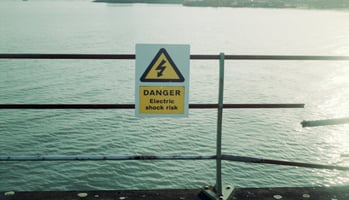What should you do when you’re asked a question in a media interview you don’t know how to answer?...
Interruptions are a regular feature of media interviews, yet they are something many interviewees struggle to cope with.
We’ve all seen or heard those tetchy interviews where a spokesperson says something like, “You’ve asked me a question, you have to let me answer” or “If you would just let me finish”.
Or the journalist says, “Can I just stop you there?”
Sometimes, a spokesperson can face several interruptions in an interview.
And it can cause them to lose their train of thought and composure, and the audience’s support.
It is something delegates on our media training courses often worry about.
So, how can they better deal with interruptions so they do not become a distraction?
And how can they reduce the likelihood of being interrupted?
Why journalists interrupt
Avoiding interruptions begins with understanding why they happen.
One of the main reasons a journalist interrupts is because they believe the spokesperson is being evasive.
You will often see this in the interview with politicians that we highlight in our media skills training blog. The journalist thinks their question is being ignored or the interviewee is answering a different one altogether, so they butt in.
This can rapidly turn into a heated exchange, with the same question being repeated and ignored.
Rambling responses, especially ones that attempt to make multiple points, are also likely to trigger an interruption.
Journalists know that long, complex answers can be hard for audiences to follow and that they will either zone out or switch off altogether. People have short attention spans.
So, they will often interrupt when they feel spokespeople are rambling.
A journalist is also likely to interrupt if they feel a spokesperson sounds robotic or is repeating a message ad nauseam.
How can you avoid being interrupted?
Well, if you are faced with an uncomfortable question or one you don’t know how to answer, don’t try to avoid it.
Instead, use the bridging technique, which we teach during our media training courses, to manage difficult questions without appearing elusive. If you really don’t know the answer, admit you don’t know – “I don’t know” is not a phrase that needs to be avoided at all costs in media interviews.
In terms of length, keeping answers between 30 and 40 seconds in broadcast media interviews will reduce the chances of being interrupted.
And no one likes a robot. So, putting messages into your words and supporting them with human and personal examples is another crucial move.
What happens if you are still interrupted?
It could still happen.
So, one of the best ways to avoid interruptions ruining an interview is to be realistic and accept you are likely to be interrupted at some point.
If you expect it to happen, you are less likely to be caught off guard and become annoyed and far more able to take interruptions in your stride.
Consider how you can prevent these interruptions from distracting the audience from the message you want to get across. And practice dealing with them.
Calm
None of us likes being interrupted when we speak. It can be hugely frustrating and feels rude. And it is infuriating if it happens repeatedly.
But it is vital spokespeople do not get rattled by these interruptions and avoid showing any frustration.
That means avoiding trying to raise your voice to talk over the presenter. No one will be able to understand what is being said when two people are speaking, or shouting, at the same time.
And what they will remember from the interview is that it became an argument. It is also the part of the interview that will be clipped for social media.
Staying calm also means avoiding criticising the interruption. Phrases like “If you would just let me finish” sound frustrated, angry, and irritable.
Instead, say something like, “I’ll come to that in just a second because I would just like to finish my previous point that…”.
That sounds more reasonable and is more likely to keep the audience on your side.
It’s worth remembering that in TV interviews - and radio interviews now that so many take place on camera - frustration and annoyance can be shown through body language just as much as it can be from words.
Deep sighs, eye rolls, folded arms, and slumping in your chair must all be avoided when faced by interruptions.
What else do you need to know?
Sometimes, it is not the journalist who does the interrupting.
Panel discussion interviews, where a reporter speaks to several spokespeople about the same issue, are a regular feature of broadcast news programmes and offer audiences the chance to hear differing viewpoints.
These are invariably live and can often turn into heated exchanges, with people talking over each other - the presenter sometimes seems more like a referee than a journalist.
Again, remaining composed is essential. A good presenter will try to ensure everyone gets the same amount of time to give their views. So, focus on making sure you are ready to take advantage of your opportunity to speak.
If you are the one doing the interrupting, the audience may well feel that you appear rude, pushy and aggressive.
And you need to keep the audience on your side.
Media First are media and communications training specialists with nearly 40 years of experience. We have a team of trainers, each with decades of experience working as journalists, presenters, communications coaches and media trainers.
Click here to find out more about our media training.
Subscribe here to be among the first to receive our blogs






